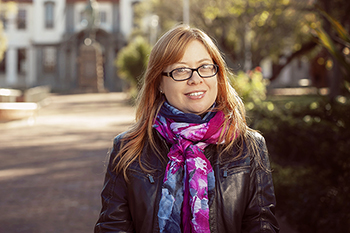Latest News Archive
Please select Category, Year, and then Month to display items
02 July 2019
|
Story Eloise Calitz
|
Photo Keagan Nkwaira
 Audience members listening attentively to the presentations at the Entrepreneurship Inter-varsity on the Bloemfontein Campus.
Audience members listening attentively to the presentations at the Entrepreneurship Inter-varsity on the Bloemfontein Campus.
The UFS continuously creates opportunities for students to develop and explore platforms where they can showcase their talents and share their innovative concepts. In the light of this, it is important for the institution to become a preferred academic knowledge partner that can conceptualise, develop, and successfully commercialise research activities, and through this foster an innovative and entrepreneurial culture that aligns to its Integrated Transformation Plan.
This is why opportunities such as the Entrepreneurship Intervarsity Competition are so important, since it encourages students to demonstrate their entrepreneurial talent, and through this connect with investors and industry leaders to start up a business.
The competition
Student entrepreneurs across the 26 public universities in South Africa were invited to submit their innovative ideas as part of a competition supported by Entrepreneurship Development in Higher Education (EDHE), in collaboration with the Allan Gray Orbis Foundation. The opportunities created through this initiative are twofold:
1. For student entrepreneurs to present their innovative ideas and businesses.
2. For universities to demonstrate their entrepreneurial talent and the ways in which they support and grow the next generation of business leaders.
The competition takes place in five stages. The process started with each student submitting their short videos and applications on the official competition site. Each institution also had the opportunity to select student entrepreneurs to take part in the competition. Fifteen students pitched their ideas during internal rounds at the UFS on 30 May 2019. Of these students, four were selected to represent the UFS at the regional rounds of the Entrepreneurship Intervarsity, where the finalists will be chosen.
The students were judged in four categories:
• Category 1: Innovative Ideas
• Category 2: Tech Businesses (existing businesses, formal or informal, undergrad or postgrad)
• Category 3: Social Impact Businesses (existing businesses, formal or informal, undergrad or postgrad)
• Category 4: General (existing businesses, formal or informal, undergrad or postgrad)
The following UFS entrants were selected to take part in the regional finals:
• Christopher Rothman for his liquid yeast culture that can be used in the fermentation of beer.
• Driaan-Lou Kemp for his patented water-saving device.
• Grace Mthembu for her electricity-saving system.
• Martin Clarke for his idea to use drone technology for the mining industry
Leading African Studies scholar to represent UFS as research fellow at Leiden University
2016-03-10

Dr Stephanie Cawood to devote three months at the African Studies Centre Leiden as a visiting research fellow to further her research on the rhetorical imprint of Nelson Mandela.
Photo: Supplied |
Dr Stephanie Cawood, Programme Director and Senior Lecturer at the University of the Free State (UFS) Centre for Africa Studies has been offered a visiting research fellowship to the African Studies Centre Leiden (ASCL) at Leiden University in the Netherlands. The ASCL is entirely devoted to the study of Africa transcending multiple faculties and is known for its extensive library.
As a visiting research fellow from April to June 2016, Dr Cawood looks forward to expanding her network as well as intellectual horizons with the broad spectrum of knowledge archived by the ASCL. “Working so closely with the scholars at the African Studies Centre Leiden will enrich my research and broaden my international footprint as a scholar,” Dr Cawood says.
Her research at ASCL follows on her doctoral research on the former president of South Africa, Nelson Mandela’s rhetorical imprint, and will explore the conceptual, cultural, ideological and historical influences that shaped the thought and rhetoric of Nelson Mandela. She is particularly interested in studying the intertextual dynamics in Mandela’s rhetoric with historical figures such as Jawarharlal Nehru, Martin Luther King Jr and Winston Churchill.
According to Dr Cawood, this research “will deepen the understanding of Nelson Mandela’s rhetorical journey from struggle to liberation and unpack the various influences that made him the political figure he ultimately became.”
During her tenure at Leiden University, Dr Cawood will prepare a manuscript to be published by the ASCL as a working paper and also present seminars.